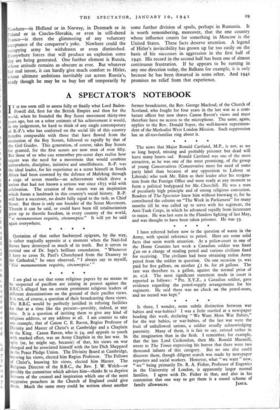I am glad to see that some religious papers by
no means to be suspected of pacifism are joining in protest against the B.B.C.'s alleged ban on certain prominent religious leaders of different denominations on the ground of their pacifist views. It is not, of course, a question of their broadcasting those views. The B.B.C. would be perfectly justified in refusing facilities for that at a time like the present—possibly, indeed, at any time. It is a question of inviting them to give any kind of religious address, or any address at all. I am content to take one example, that of Canon C. E. Raven, Regius Professor of Divinity and Master of Christ's at Cambridge and a Chaplain to the King. Canon Raven, who is 54, and appeals to youth with marked effect, was an Army Chaplain in the last war. In spite (or, he might say, because) of that, his views on war changed and he associated himself with the late Dick Sheppard in the Peace Pledge Union. The Divinity Board at Cambridge, knowing his views, elected him Regius Professor. The Fellows of Christ's, knowing his views, elected him Master. The Religious Director of the B.B.C., the Rev. J. W. Welch—or possibly the committee which advises him—thinks fit to deprive listeners of the counsel and inspiration which one of the most suggestive preachers in the Church of England could give them. Much the same story could be written about another former broadcaster, the Rev. George Macleod, of the Church of Scotland, who fought for four years in the last war as a com- batant officer but now shares Canon Raven's views and must therefore have no 'access to the microphone. The same, again, applies to the Rev. Donald Soper, the well-known superinten- dent of the Methodist West London Mission. Such suppression has an all-too-familiar ring about it.
* *


























 Previous page
Previous page